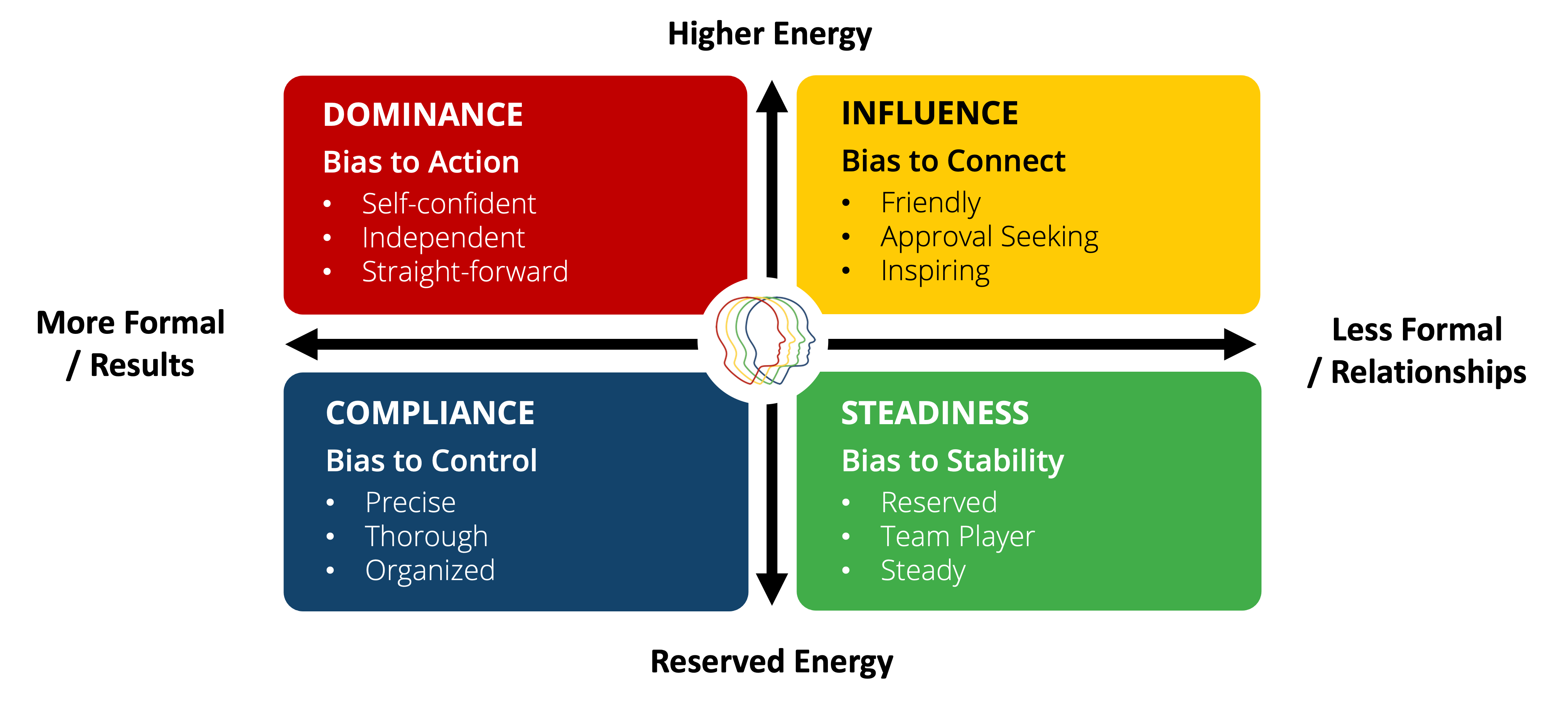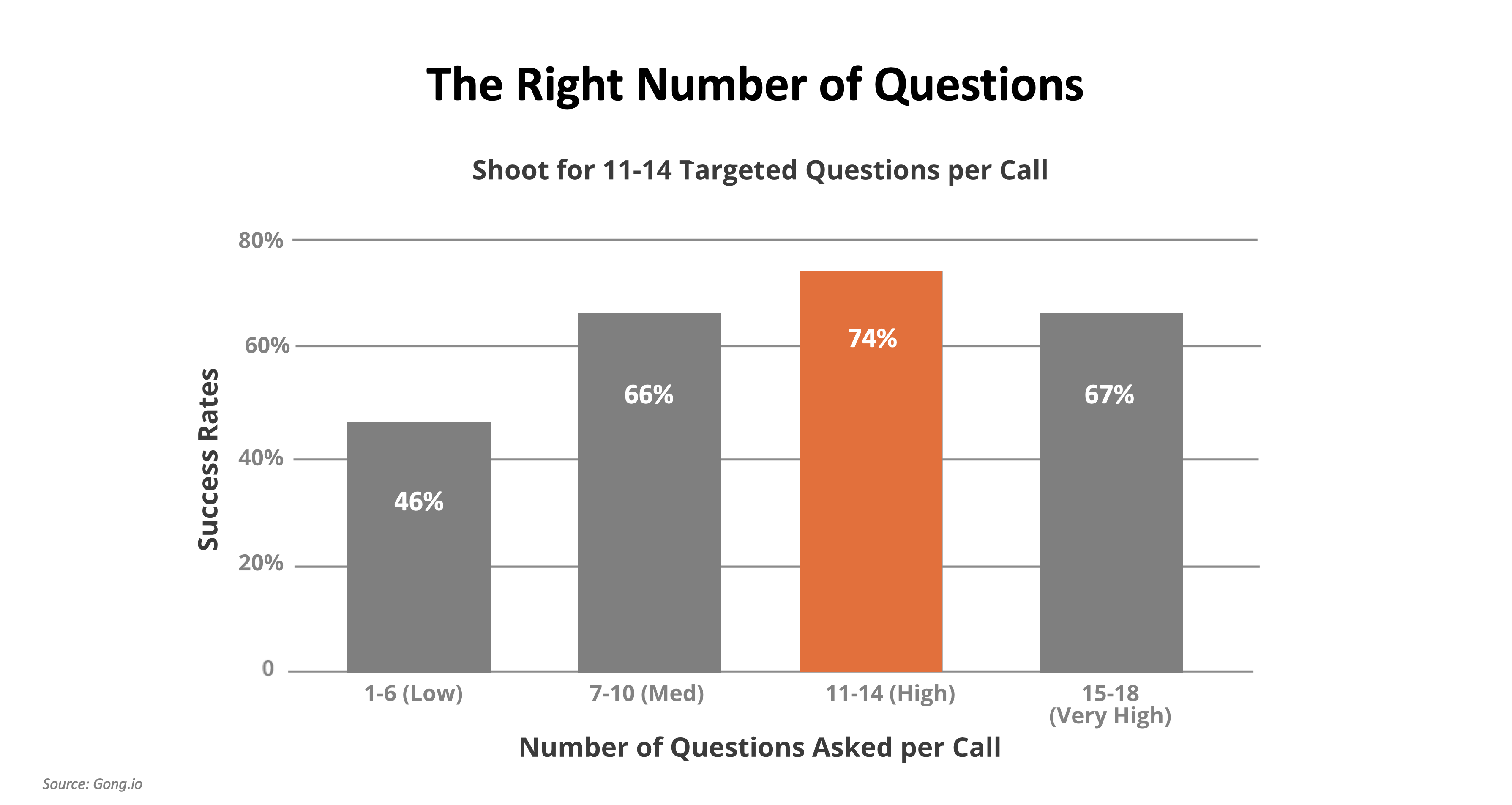Selling is hard.
One can argue to the contrary, but we’ve been helping salespeople get out of selling slumps since 1977.
Every single conversation we have with a customer revolves in some shape or form around the idea of finding effective ways to help their team boost sales. The solutions that we’ve uncovered are just about as nuanced as they can get.
There is no magic formula or silver bullet to solving sales challenges. There is, however, a starting point.
Sales managers have to know their people.
Yes, you have a sales team — but that team is made up of unique individuals. Each member of your team has their own reason for showing up in the morning (or obstacle if they’re not showing up). They have their own goals, which motivate them differently. They have different preferences for communicating, and how they send and receive feedback.
You have to learn how to ask the right questions to your people if you want to come alongside them and lead them out of a sales slump.
We live in an individualistic culture that celebrates the lone wolf who is able to overcome insurmountable odds with little outside help.
The Importance of Focusing on Individuals Within Your Sales Team
“The strength of the team is each individual member. The strength of each member is the team.”
—Phil Jackson, former Chicago Bulls & LA Lakers basketball coach
Work on Communication Skills
As a sales leader, you undoubtedly are aware of the various personality styles that exist in your team. Some people have high energy while others are more laid back. Some are task oriented, and others are more focused on developing relationships.
You’ve likely heard of various personality assessments, perhaps your team has even taken them before. In our experience, the most successful sales teams are led by managers who understand the personality nuances of the people on their team.
The first place to begin when it comes to helping your team sell more, is making sure the people on your team are hearing you.
Everyone has a preferred communication style. That style directly relates to their behavior style, which you can learn more about in Do You Have the Right Talent in the Right Seats?
One of the first things we do in our sales team training programs is a DISC behavior assessment. Recognizing the behavior styles of your team will enhance your communication with them.
Here’s a brief overview:

With formal, task oriented communicators like Dominance and Compliance types, you’ll be able to get straight to the point. They don’t need a lot of chit chat, in fact it can actually annoy them or make them a bit uncomfortable. If you need to have a conversation with a Compliance style salesperson about their numbers, you’ll want to have data that they can look at which supports your point.
You’ll want to warm up the more casual, relationship-focused salespeople with some conversation before making your point. Ask them about their week, family, extracurriculars, etc before getting to your point. Then use a statement of intention to let them know what you really want to talk about.
Remember, you are speaking their communication style — not your own.
Another important factor in communication is time. Ask your salespeople what the best time of day is for you to speak with them. Even though you’re the boss, it isn’t wise to use that power to schedule time on people’s calendars when they have other selling tasks they would prefer to be doing.
Determine Areas of Weakness & Find Opportunities for Growth
There are plenty of ways to conduct a SWOT analysis with people on your team. While we’re biased and think our Emotional Quotient Assessment is one of the best tools around for helping your team members gain self-awareness and make better decisions, the important thing is that you ask good questions.
You’ll uncover a lot by conducting a deep dive on a salesperson’s weekly activity and book of business.
- How many calls are they making?
- How many appointments are being set?
- How many demonstrations or samples are sent out?
- How quickly are prospects followed up with?
- What is the overall close rate?
If a salesperson is having issues selling and you ask questions like the ones above, you’ll likely uncover a weak spot. The salesperson might blame their lack of sales on the economy or supply chain issues, but to uncover the real problem just look for the problem area.
If enough calls are being made but appointments aren’t being set then some prospecting training may be in order. If appointments look good but they aren’t going anywhere they may need help knowing what to say and do in the meeting.
You have to do this on an individual basis with each member of your team. Train the group, and coach the individual.
Set and Review SMART Sales Goals Regularly
We’ve written about SMART goals, or more specifically about Setting SMARTer Goals With Your Sales Team.
As a recap, the SMART Goals acronym stands for:
Specific
Measurable
Achievable
Realistic
Time-bound
When it comes to following up on those goals, you just have to figure out what works. Reps who are struggling may need daily communication for a while. Some people might even prefer it.
From there you can move to reviewing goals weekly, and then at least monthly. Again, don’t paint with a broad brush. Not everyone on the team is going to need daily accountability calls, and imposing that your top performers might decentivize them.
Problem Solving Skills
Your sales team is likely already skilled at solving problems. Nearly every sales training program that exists focuses to some extent on uncovering a customer’s problem, then presenting your solution in a way that demonstrates it solves the customer’s problem.
Applying this same mentality to selling problems can be useful. Problems are (obviously) solved by solutions, and solutions are uncovered by asking the right questions.
The best salespeople are trained to ask multiple layers of questions when trying to uncover the root cause of a problem. We call it three-deep questioning.
The first question reveals the facts on the surface. The second question asks about the emotional response those facts are creating. The third question moves beyond the facts and emotions, and gets to the heart behind the need for change. Here are some examples:
Product-related questions
- How much downtime are you currently experiencing?
- What impact does that challenge have on your efficiency?
- What are you doing to address that challenge?
Service-related questions
- What do you like most about your current provider’s service capabilities?
- If you could change anything about your relationship with your current provider, what would that be?
- How would you and your company benefit from that change?
Support the Sales Process
We’ll talk about the importance of having a singular sales training program later, suffice it to say for now that you need to have one. Most sales teams these days are made up of individuals with varying experience levels, and tenure at your company.
When a new salesperson is hired, they will likely be comfortable using a sales process different from the one you use. New hires have to learn and adopt your sales process as quickly as possible, because you as the manager can’t coach to a system you don’t personally know.
So the first step to supporting your team’s process is by ensuring everyone is familiar with the company’s sales training program, and that they stick to it.
The support each individual needs will vary, which is again why you can train a group, but must coach the individual.
Supporting the individual means finding out what their day looks like. What is their work cadence? What time of day are they most effective, and at what tasks? How effective is their calendar planning, and do they stick with what’s on the calendar? Have they learned how to prioritize, delegate, and eliminate the “fires” that pop up during the day?
If you’ve openly discussed your mutual expectations of each other and figured out how often you need to communicate to improve sales, then providing support becomes very simple. You’ll know what to do and when to check in to see how things are going.
Give Your Sales Team a Confidence Boost
As a sales leader, you know that success breeds confidence. If you have a rep who needs a bit more confidence they probably just need to take a little more action to see that they do actually have what it takes to succeed.
If you raise the activity, you’ll raise the results. When you raise the results, you’ll raise belief. This becomes cyclical because when you raise belief, you’ll raise activity.
You can remember this with the mnemonic expression “Raise the BAR” (Belief—Action—Results).
The easiest way to get someone on this BAR-raising merry-go-round is by raising activity. Raising someone’s belief through words alone is difficult. And it’s nearly impossible to increase results without changing some type of behavior.
It’s natural to think that a sales contest is just the ticket for motivating people to modify their behavior! After all, isn’t money one of the greatest motivators out there? The answer is no. Did you know there are some people who will intentionally self-sabotage their sales if it means they can eliminate themselves from qualifying for a sales contest?
Some people don’t like the pressure. We all have different motivators in life. Money doesn’t work at motivating everyone, and thus won’t serve as a means of boosting confidence.
Ask your team what motivates them, or have them take an assessment to figure it out. Find each person’s key motivators and incentivize them that way.
Here are the common motivators that we test attendees for prior to taking our sales training program IMPACT Selling:
- Theoretical: motivated by learning, even learning for the sake of learning
- Utilitarian: motivated by ROI in both time and money (most — but not all — salespeople rate high in this category)
- Aesthetic: motivated by balance and harmony for things being in their place
- Social: motivated by connection with people, and their ability to help others at the drop of a hat
- Individualistic: motivated by influence and power, they want control and freedom of their environment
- Traditional: motivated by following rules, they value systems and structures
Boosting confidence happens when you speak the sales person’s language so they hear your accolades. Telling someone they are awesome at something they want to be awesome at will boost their confidence.
How to Improve Sales as a Sales Team
“If everyone is moving forward together, then success takes care of itself.”
—Henry Ford
Get Organized as a Team
The most important thing you can do for your sales team is teach them to use the same system and approach when selling.
We touched on this earlier, but it’s not only impossible for you as a sales leader to coach people how to maximize systems that you don’t personally have experience with, but it’s confusing to your sales people.
If your selling system works, and is producing sales, then stick with it and teach it to everyone. If everyone is struggling, then perhaps it’s time for a change. For unity’s sake within your team, you want everyone using the same method to accomplish the same mission. Using CRM software is a great way to keep your sales team organized and improve inner team collaboration.”
Invest in the Team on a Personal Level
We’ve already discussed the fact that people communicate differently, and are motivated by different things, but sales managers do need to find ways to invest in their people as a group.
This can naturally happen during team meetings or sales training days, but it doesn’t have to end there.
People thrive on meaning and purpose. Find ways to give it to them. Maybe the team can build camaraderie and bond while building a house for Habitat for Humanity. In the winter, perhaps you can do a toy or coat drive around the holidays. That could even be something customers can participate in.
I’m not saying to never take your team out to a restaurant, or to the bowling alley, but that isn’t going to be an event that gives you a return on your time. It will be fun, but building someone a home gives people meaning.
So ask your team what kinds of things move and inspire them. Then figure out what you can do together as a group to make that inspiration happen.
Will that directly change your sales? No. It will change a person’s confidence though. It will also change their perspective of you, and the company they work for, and give them a brighter disposition and better attitude.
A better attitude during the work day can improve sales.
Friendly Competition
Salespeople are by nature highly competitive. This has pros and cons, as you don’t want people being so competitive that they don’t want to help their peers.
Most people (not just salespeople) are more willing to do something for someone else’s benefit, than if they themselves are the only beneficiary. For example, if you split up your sales team into two or three groups, and have a contest around increasing in-process measures or KPIs like making prospecting calls, you will likely see an increase in calls across your team.
That’s because when a salesperson didn’t make calls before the team contest, it only hurt themself. That is unfortunately a consequence too many of us are willing to deal with. During the contest, however, the lack of action has negative consequences on other people. That’s much harder to deal with because we are social creatures who depend on one another.
The reward for contests like this don’t even need to be extravagant. Bragging rights are incredibly powerful all on their own.
Collaboration
How do you get your team to work together so they know they’re not taking from each other, but instead are sharing practical and effective selling tips that they’ve learned?
One of my favorite methods is by creating a buddy selling system. Assign two colleagues to spend a day or two working together in the field.
You can either put older and younger (or experienced and less experienced) colleagues together so they can cover each other’s weaknesses. Tenured sales people know the ropes. They’re full of practical advice, and have seen a lot. The downside to this is they can become set in their ways.
Newer salespeople tend to have an easier time thinking outside the box. They’re also more comfortable and able to share tips on using different technology — like prospecting using social media or conducting virtual meetings.
Another approach is to have two veteran salespeople tag-team the day. Top performers are more likely to have a competition with each other, which is another great way to create a little friendly competition amongst peers.
Present Incentives
There may be something that everyone on your team wants, that you can give them as a reward for turning sales around.
As a warning, most salespeople don’t want to be struggling. If your team is hurting, simply giving them a carrot to move the needle may cause them to perceive you as out of touch. Your people might need a new sales training program to individualized coaching to help them continue selling in hard times. As a shameless plug, we’ve got a webinar about selling through hard times.
With that said, there are likely a few things your people want. The big end-of-year sales trips were for the most part canceled the last couple of years. The world adapted to selling virtually out of necessity, and we seem to be holding onto that capability now out of its sheer convenience.
Your people are likely craving some connection. Find ways to give that back to them.
Also, your salespeople face incredibly high tax rates. Top performers could be losing up to 50% of their income just in taxes. Working with your company to put bonuses into something that’s tax deferred could be a huge incentive for a salesperson.
Remember, don’t make your people work to earn everything. Find some kind of incentive that people want that you can give them with relative ease, and then give it to them.
Incorporate Tools
The fundamentals of selling stay the same over time, but how we sell is in a constant state of flux. Here’s an example.
We all saw a drastic change to how sales is conducted from the Covid 19 pandemic. One report on salespeople during the pandemic stated that 62% of sales professionals say they’ve lost a sale because they couldn’t personally meet with a buyer.
The salespeople’s logic was that they lost the sale because they couldn’t build trust virtually, like they were able to do on a traditional in-person business trip where they could meet face-to-face.
If that doesn’t scream “we need training on how to sell virtually” then I don’t know what does!
The selling-fundamental of building trust was still there, it just needed to be delivered differently. Talk to your team and find out what they need if sales are down. Listen to their challenges and complaints, and figure out what they’re really saying.
The Brooks Group offers a ton of valuable sales assessments and tools that can help. In fact, every chapter in Michelle Richardson and Russ Sharer’s book Agile & Resilient: Sales Leadership for the New Normal ends with a QR code for a free tool that you or your team can use to improve team sales.
Track Progress
There are two types of key performance indicators (KPIs) that you should track: in-process measures and end-process measures.
In-process measures are ones that your salespeople can directly control. Examples include the number of calls made or the number of times they asked for an appointment.
End-process measures are the results that come from the in-process measures. This includes appointments booked, or total sales.
Too many sales teams focus on the wrong thing. We all know to “control what we can control”, but still somehow find ourselves focused on the results created by the actions that we can control, instead of on the specific actions that influence those results.
Whatever you track, grows. If your team knows you care about the number of calls, that’s where they’ll focus. If they know you care about giving samples, or performing demos, that’s where they’ll focus.
People don’t have an infinite supply of areas they can focus on. So be sure to pick your KPIs carefully, ensuring the things you measure will improve the results you want. I typically recommend tracking five KPIs, analyzing them for six months or so (longer if your sales cycle merits it), and then adjusting from there.
For further reading check out this great article written by my colleague, Lisa Rose, titled The Account Management KPIs You Should Be Tracking.
Train Your Team By Role Playing
Leadership expert John Maxwell told the story of a time he was on a plane that almost crashed. The pilot was in the process of landing the plane, but something went wrong. The pilot reacted so quickly that the plane seemingly bounced off the runway and soared back into the sky without incident. The pilot circled around the runway for reapproach, and landed the plane without incident.
Maxwell asked the pilot if that issue had ever happened to him before while landing. The pilot replied it had not. Maxwell then asked how the pilot was able to react so fast, to which the pilot replied “Simple. I’ve played that scenario out a thousand times in my head. I didn’t have to think about what to do because I decided what to do in that scenario 20 years ago”.
Role playing works. The reason is because it utilizes the skill of advanced decision making.
Salespeople who role play different scenarios with their team are better prepared to respond confidently when the same or similar scenario occurs with a customer.
You likely already conduct routine training for your sales team. People sometimes complain that role playing is corny, or they feel strange doing it. While these excuses might be pardonable for some, they should not be accepted if coming from a salesperson.
Ask your team to share a scenario they didn’t know how to handle, or common objections they constantly have to overcome, and have the team role play those scenarios. You can also have people conduct role plays to learn how to ask powerful questions. Or pick a vertical and role play scenarios specific to those types of customers.
Introduce New Tactics
As stated before, it is critical that everyone on your sales team is using the same selling system. There is, however, room to do tasks a little bit differently.
Imagine if everyone on your team was asked to walk up a flight of stairs. One person might walk normally, another might run. One might take double steps, and perhaps someone danced their way up. At the end of the exercise everyone will have completed the same objective (get to the top of the stairs), but they did it differently.
That’s a good way of ensuring individual tactics stay within the communal selling system. If a salesperson shares a tactic they use, but it deviates from the system, then proceed with caution.
Tactics can be shared during team trainings, role playing exercises, and ride-alongs. Look at the areas where people are struggling, and share new ideas to strengthen that area.
If someone is struggling to find prospects — try prospecting on social media.
If it’s difficult booking appointments — try asking more questions to get further beneath the surface issue.
If sales meetings are falling flat — try asking better strategic questions
If close rates are down — try incorporating what you know about behavior styles into your meetings.
By the way, if it feels like you’re grasping at straws to find the root cause of the challenge your team is having, feel free to give us a call. Our team is really good at helping customers figure out the underlying reason behind low sales numbers.
Learn New Approaches
Sometimes, the salesperson doesn’t need to change what they’re doing, but rather how they’re doing it.
For example, research shows that the best time of day to make sales calls is early in the morning. If checking email is the first thing your team does when they start work, then perhaps a simple tweak in calendar planning will result in more appointments, and thus higher sales. If your team struggles with this you could even hand out a $10 gift card to anyone who doesn’t check email until a designated time, say 11:30am.
Another adjustment could be in how salespeople approach their meetings. In our IMPACT Selling Seminar, we talk about the right number of questions that lead to success in sales.
During a 30-minute call, your salespeople should be asking between 11-14 questions. If they’re selling to the C-Suite, then they’ll want to limit themselves to asking 8-11 questions because people in the C-suite typically don’t have as much time.

Celebrate Wins
It’s easy remembering to recognize people for their success when it’s something new to them. New hires tend to get much more recognition than veteran salespeople. The top-performers usually receive their accolades, but the majority of the folks in the middle can easily be overlooked when it’s time to dish out kudos.
Some people like the awards and plaques, but most people just want to know that their efforts are being noticed. If you’re introducing new strategies or tactics on your team, celebrate those wins as people work to learn and incorporate what you’re asking them to do.
You can designate Friday mornings for sharing and celebrating wins via email (Slack even has an app for this called Weekly Wins). Maybe you can celebrate bigger wins in person during your team training, or create some kind of silly trophy whose value is in its bragging rights.
As the story goes, an engineer at Hewlett-Packard burst into his manager’s office with the solution to a challenge the company had been facing. His manager grabbed a banana from his lunch, and handed it to the employee to recognize his hard work in finding a solution. The tradition grew, and now the “Golden Banana Award” is one of the highest honors an employee at the company can receive.
However you celebrate wins, do it publicly in front of your entire team. This isn’t to say that you can’t recognize people in private, for example, during a one-on-one meeting. You can and you should. But there is a lot of motivational power in “seeing your name in lights” so to speak. Not liking the boss is one of the top reasons people cite for quitting their job.
Safeguard the morale on your team by celebrating wins, together.
Improve Sales Effectiveness With The Brooks Group
The Brooks Group offers a wide array of assessment tools and an award-winning sales training program called IMPACT Selling® Seminar to help sales teams boost sales. It’s a proven sales methodology taught to over one million sales professionals to help them close more deals — more often. In 2022 it was ranked as the best virtual sales training by Investopedia for the second year in a row.
Odds are we’ve already helped a company similar in size to yours overcome the same sales-related challenge you’re facing. If you’d like to learn more about what we can do for you just reach out to us and set up a time to talk.




